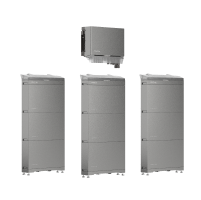How the UK EV Charger Grant Works for Homeowners in 2026
The UK government has been accelerating electric vehicle adoption for its reduced carbon footprint, mainly by supporting drivers with an EV charger grant for home installations. This helps flat owners and eligible renters cut the upfront cost of installing a private chargepoint, making the switch from petrol to electric simpler and more affordable.
What Is the UK EV Charger Grant for Home EV Chargers?
The EV charger grant is a UK government subsidy that helps reduce the cost of installing a home EV charger in a residential property. It is a “replacement” for the former Electric Vehicle Homecharge Scheme (EVHS), and is currently administered by the Office for Zero Emission Vehicles (OZEV).
If you are qualified for the UK government EV charger grant, you’ll receive either a maximum of £350 or up to 75% off the cost to purchase and install a socket, whichever amount is lower.
Here’s an example: Say that your total cost of buying and installing a home EV chargepoint is around £420. The home EV charger grant will cover 75% of this amount. Hence, you will get a subsidy of £315.
Now, say your total installation cost is £600. 75% of that amount is £450. However, since the grant is capped at £350, you’ll only get £350. This means that you need to shell out the remaining £250 to cover the full installation cost.
Who Is Eligible for the UK EV Charger Grant for Homeowners?
You can apply for the UK’s EV chargepoint grant if you meet the following property and vehicle requirements.
Property requirements
- You own/rent and live in a flat. You are also qualified if your flat is bought through a shared ownership scheme.
- Your property has its own private off-street parking space.
The requirements above imply that people living in terraced, detached, or semi-detached houses are not qualified for the grant. You must convert the property into a flat to be eligible for the subsidy.
Vehicle requirements
- Your vehicle must be an OZEV-approved electric vehicle. Moreover, you must be the owner or lessee (for at least 6 months) of the EV. You are also qualified if you are using the EV as a work vehicle for at least 6 months.
- You may also apply if you have ordered an OZEV-approved EV or plug-in hybrid.
Basic EV Charger guidelines
Once you determine that you’re eligible for the EV charger grant, it’s important to follow key guidelines for installing a home EV charger safely, efficiently, and in a way that keeps your system future-proof. After all, an EV charger comes at a significant cost, even with a government subsidy in place.
- Your property must have sufficient electrical capacity to support the charging unit. Consult a professional electrician or installer to help you. You must also verify that the wiring, circuit breakers, and load capacity comply with local safety and compliance regulations.
- The EV charger must be mounted in a sheltered and accessible space that is close enough to the parking spot for easy connection without stretching cables.
- Pick an EV charger engineered for long-term reliability, sustainability, and ease of control.
EcoFlow’s PowerPulse 2 comes with an advanced smart mode feature that supports customizing energy goals and preferred charging times for optimized EV charging.
This unit also integrates seamlessly with home energy systems for zero-cost charging experience. And for easy energy and performance monitoring, EcoFlow’s PowerPulse 2 connects to an innovative mobile app where you can track your EV charging, home energy usage, and overall system performance.
How to Apply for the Home EV Charger Grant in the UK
An OZEV-approved installer, not the homeowner, is responsible for submitting the EV charger grant application on your behalf. However, to facilitate a seamless application for the subsidy, you must follow the steps below.
Step 1: Get a quote for the installation work from an OZEV-authorized installer and find a legitimate installer near your area.
Step 2: Request the installer to start your claim.
Step 3: You will receive an email that requires you to complete a form for an eligibility check. Complete it and submit.
Step 4: Once OZEV deems you eligible, the installer can now apply on your behalf.
Upon OZEV approval of the application, they will inform your installer that they may start the work. The work must be completed within 90 days from your application approval date. In case the work was unfinished, the installer may request an extension. Failure to request an extension past the 90-day period will require the installer to submit a new application.
Note that the funds go straight to the installer. It is not convertible into cash. Your invoice will show the total EV charging installation cost minus the grant amount. Meanwhile, the installer must give the details of your chargepoint to OZEV, together with an invoice and installation photographs.
EV Charger Grant Timeline for UK Homeowners Leading Up to March 2026
The UK EV charger grant was originally set to run until March 2025. But to give homeowners and renters more time to prepare documents and to coordinate with their installers, the grant was extended by a year. The new deadline for applications is now untilMarch 31, 2026. Applications must be made during this window for the homeowner to qualify.
To meet the specified deadline, you must gather the required paperwork early, including proof of property ownership or tenancy and vehicle eligibility documents. You must also coordinate with a certified installer in advance, as demand for EV charger installation is expected to increase near deadlines.

Government EV Charger Grant Eligibility: Who Cannot Apply?
Not everyone can apply for the UK’s EV chargepoint grant. Below are some conditions that can make you ineligible for this subsidy program:
- You are moving house or planning to move.
- You have already claimed the grant or its predecessors (i.e. the Electric Vehicle Homecharge Scheme or EVHS and the Domestic Recharge Scheme).
- You rent in a property where the landlord also lives.
- You want a chargepoint replacement, even if the existing one is incompatible with your new car.
- Your property is situated in the Channel Islands or Isle of Man
- You are living as a lodger in someone else’s property without an off-street parking.
What kind of product or solution are you interested in?


Other UK EV Charging Grants Worth Knowing
Beyond the main EV charger grant for individual flats, there are other UK subsidies that support wider EV charging infrastructure.
One of these is the EV Infrastructure Grant, a subsidy that benefits landlords or owners of a wider building that requires installation of multiple chargepoint sockets. Works covered by this grant include current and future installation. For instance, the EV infrastructure grant can cover future acquisition and installation of wirings and posts.
The grant provides up to £30,000 per building or 75% of costs, with caps per parking space and per socket.
Why the EV Charger Grant Matters for UK EV Drivers and Renters
The upfront cost of a residential EV charger can be a major barrier. Many UK drivers delay switching from petrol to electric because of installation costs. With the UK government EV charger grant and related incentives, that cost becomes far more manageable. For renters and flat owners, the grant is even more helpful. It provides them with access to a private charging station that would otherwise be out of reach due to its significant cost.
Furthermore, the EV charger grant lifts the cost barrier to EV adoption. As residential EV chargers become more affordable thanks to the grant, more drivers will transition to a more sustainable and environmentally friendly transportation mode. Hence, this government subsidy benefits not only UK drivers but also society as a whole, due to the reduced carbon emissions resulting from wider EV adoption, which is powered by renewable energy.
EV Charger Grant for Homeowners: The Takeaways
Charging your electric vehicle at home does not need to be costly. The UK government offers an EV charger grant for homeowners and eligible renters that can cover up to £350 or 75% of installation costs, whichever is lower. Check your eligibility, gather your documents, and work with an OZEV-approved installer to secure your funding before the March 31, 2026 deadline.
Consult with an EcoFlow professional today to design a cost-effective home EV charging and storage solution that makes the most of the UK’s EV chargepoint grant.
FAQ
How to get a free EV charger in the UK?
You can’t have access to a completely free EV charger, but you can apply for the OZEV’s EV charger grant to help with the costs. Availability depends on eligibility, property type, and current incentives, which change over time.
How much for EV charger installation?
The average 7kW EV charger installation cost, as of this writing, is around £1,110. The cost depends on charger type, power rating, and wiring needs. Grants or incentives may reduce costs, while complex installs can increase the price.
Can I install an EV charger by myself?
No, you should not install an EV charger yourself. It requires a qualified electrician to ensure safety, meet UK wiring regulations, and maintain warranty or grant eligibility. DIY installation can be unsafe and non-compliant.
Does the EV charger grant apply if I already have solar panels or a home battery?
Yes. Having solar panels or battery storage does not affect eligibility. The grant focuses on your property type and EV ownership, not your existing energy systems.
Can landlords apply for the home EV charger grant?
Landlords cannot use the homeowner grant but may qualify for the EV Infrastructure Grant, which funds chargepoints and future-proofing works across rental properties.


